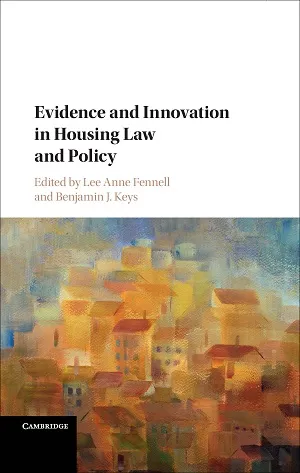New Book on Housing Policy Seeks to Widen Conversation about How and Where People Live
Housing is one of the most complex, divisive, and foundational areas of law and policy. It has been linked to health and well-being, educational outcomes, and earnings and employment. In short, as Professor Lee Fennell, the coeditor of a new book on the topic observes, “housing matters, and matters profoundly, to individuals, families,
and the communities in which they live.”
These were the ideas behind Evidence and Innovation in Housing Law and Policy (Cambridge University Press, 2017), a volume of multidisciplinary scholarship that explores complicated questions about lending, homeownership, affordability, and fair housing. The deeply human implications of housing were also a driving force behind the editors’ decision to publish the book with free and open online access—which they hope will encourage more people to join the dialogue about where and how people live.

Evidence and Innovation in Housing Law and Policy
“We wanted the people engaged in current debates about housing issues to be able to readily share chapters from the book with each other and use them as springboards for further dialogue,” said Fennell, who edited the volume with Benjamin J. Keys, former codirector of the University of Chicago’s Kreisman Initiative on Housing Law and Policy. Fennell, the Max Pam Professor of Law, now leads the Kreisman Initiative with Jeff Leslie, Director of Clinical and Experiential Learning, Clinical Professor of Law, and Paul J. Tierney Director of the Housing Initiative. Keys is now an assistant professor of real estate at the University of Pennsylvania’s Wharton School of Business.
The book, which includes 13 chapters featuring contributions by 19 leading scholars of housing law and policy, grew from a June 2016 conference that brought together more than three dozen academics and policy professionals to examine innovation and evidence in housing law and policy. The book features work by many of those participants, including Lior Strahilevitz, the Sidley Austin Professor of Law; Senior Lecturer Richard A. Epstein, the James Parker Hall Distinguished Service Professor Emeritus of Law; and other leading thinkers from academia, government, and private consulting.
The book is organized around housing’s two “interlocking” roles: as a vehicle for building community and as one for building wealth.
“These [two roles] carry implications both for the households who consume residential services and for the larger economic, political, and spatial domains in which housing plays such a primary and contentious role,” the editors write in the book’s introduction. “Cumulatively, the pieces here confront and respond innovatively to the dilemmas that these two facets of housing create for law and policy at different scales of analysis.”
The book is divided into four parts, beginning with a big-picture look at housing law and policy. The second section focuses on housing’s meaning within the community and examines questions of community stability, change, and perceptions. The third section turns to housing as a means of building wealth for consumers. The book closes by examining the risks and returns of housing and the financial system.
The book breaks the typical and often-siloed approach to housing law and policy, Fennell said. “Housing issues are so important that we need everyone working together to address them.”



